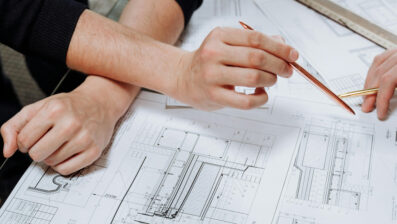Knowing typical interview questions for the role of a Facilities Manager is key as this gives you an idea of what to expect before you head into the interview.
Armed with this knowledge, you can carry out some preparation so that when you’re in front of the employer or recruiter, you know how to answer the questions effectively.
There’s nothing worse than not knowing how to answer a question as this can indicate a weakness in your ability to perform in the role – even if that’s not the case. It’s also quite stressful when you’re not sure how to answer, as it can create a sense of unease.
Whilst the questions in this blog aren’t all necessarily going to be asked in an interview, they give you an idea of the type of areas that will be covered.
Let’s get started.
What experiences led you to a facilities management career?
The question aims to understand your background, motivation, and relevant qualifications for the role.
It helps assess whether your experiences and motivations align with the demands of the position and the organisation’s culture.
Example answer:
“I’ve always had an interest in ensuring the efficient and smooth operation of physical spaces. This interest was first piqued during my time as a maintenance technician at Company X, where I enjoyed troubleshooting and resolving facility-related issues. As I progressed in my career, I realised the critical role facilities management plays in the overall success of an organisation.”
What’s your process for determining facility maintenance requirements?
With this question, the interviewer wants to understand your approach to maintaining a facility. Your response shows your proficiency in assessing maintenance needs, prioritising tasks, managing budgets, and coordinating with internal and external stakeholders.
Moreover, it serves as a means to gauge your familiarity with industry standards and your ability to ensure that the facility functions run smoothly.
Example answer:
“My process for determining facility maintenance requirements involves regular inspections, data analysis, and prioritisation of tasks based on safety and operational impact. I emphasise open communication with stakeholders, aligning maintenance with organisational goals, and staying updated on industry best practices to ensure cost-effective facility maintenance.”
Can you describe your experience in managing facilities of a similar size and complexity?
This interview question helps evaluate your suitability for the Facilities Manager role by assessing your qualifications, capability, and cultural fit.
It aims to determine whether or not you have the necessary experience and skills to effectively manage facilities of a comparable size and complexity, anticipating your ability to address the challenges and responsibilities associated with the role.
Example answer:
“In my previous position, I oversaw a facility with a similar square footage and layout, comprising multiple buildings and complex infrastructure. This experience involved managing a team of maintenance staff, implementing preventive maintenance programs, and addressing issues. I understand how to coordinate facility operations, ensuring compliance with relevant regulations, and optimising budgets to meet the organisation’s needs. Additionally, I’ve managed the transition to more energy-efficient systems, which significantly reduced operational costs.”

How do you prioritise maintenance and repair tasks to ensure minimal disruption to daily operations?
This helps the interviewer/ recruiter understand your ability to plan and organise maintenance and repair works. Your response provides insights into your decision-making and problem-solving skills.
Additionally, the question focuses on your capacity to ensure the uninterrupted daily operations of the facility which is crucial, as minimising disruptions helps maintain productivity and business continuity.
Example answer:
“I categorise maintenance activities into three levels of priority: critical, high-priority, and routine. Critical tasks take precedence and are addressed immediately, often during non-operational hours. High-priority tasks, such as those affecting core business functions, are scheduled during less busy periods or coordinated with department heads to minimise impact. Routine tasks are planned in advance and often performed during regular maintenance works. Clear communication with staff is crucial. I work with them to align maintenance schedules with operational needs which allows us to maintain the facility’s integrity while ensuring minimal disruption.”
Can you share an example of a successful cost-saving initiative you implemented in a previous role?
This interview question assesses your ability to identify and implement effective cost-saving measures – a key skill in the role of a Facilities Manager. By giving a specific example, the question helps the interviewer understand your practical experience in reducing operational expenses and optimising resources.
Your response also provides insights into your problem-solving skills, financial acumen, and your potential to contribute to the organisation’s bottom line.
Example answer:
“In my previous role, I identified an opportunity to reduce energy costs significantly. After conducting an energy audit, I noticed that a substantial portion of our utility expenses was attributed to outdated lighting systems. I initiated a project to upgrade to energy-efficient LED lighting throughout the facility. We partnered with an energy services company, used rebates and incentives, and completed the retrofit with minimal initial expenses. This led to a 30% reduction in energy use and significant cost savings.”
How do you ensure compliance with safety regulations and industry standards in your facilities management?
This question helps evaluate your ability to maintain a safe and compliant facility. It further helps the interviewer assess your understanding of relevant safety regulations and industry standards, your approach to implementing and monitoring compliance measures, and your ability to reduce risks.
In turn, this provides an insight into your knowledge of best practices and your capability to adapt to evolving safety requirements.
Example answer:
“Ensuring compliance with safety regulations and industry standards is a top priority. To achieve this, I stay well-informed about the latest industry best practices through education and networking. I also carry out safety audits and inspections to identify areas of improvement and potential violations. By working with my team, I establish and implement safety protocols and training programs for staff. Additionally, I foster open communication with relevant regulatory authorities and engage in routine meetings to address any concerns.”
Describe a challenging conflict you faced with a team member or vendor. How did you resolve it?
This aims to assess your ability to effectively handle and mediate disputes. It helps the interviewer evaluate your candidate’s communication, conflict resolution, and negotiation skills, as well as their capacity to maintain productive working relationships internally and externally.
Your response to this question offers insights into your problem-solving approach and your potential to maintain a good work environment.
Example answer:
‘In a previous role, I encountered a conflict with a vendor responsible for our HVAC maintenance. This was a recurring issue, with the vendor consistently failing to meet service level agreements, resulting in uncomfortable working conditions. To address this, I spoke with the vendor, highlighting the impact on our facility’s operations. We carried out a review of our service level expectations and developed a revised maintenance plan. This collaborative approach led to a significant improvement in service delivery and resolved the conflict.”
What software or tools do you use for facilities management, and how do they improve your efficiency?
This question aims to assess how familiar you are with different technologies and your ability to use these tools.
It helps evaluate your adaptability to industry advancements and your knowledge of software solutions that improve tasks such as maintenance scheduling, asset tracking, and resource allocation.
Example answer:
“In my role as a Facilities Manager, I have used a range of software to improve the efficiency of operations. One tool I’ve used is Computerised Maintenance Management System (CMMS) software, which has been key in streamlining maintenance schedules and work orders. This allows me to track asset performance, manage maintenance tasks, and prioritise repairs. Additionally, I’ve implemented Building Information Modeling (BIM) software to create digital models of our facility, which helps with space planning and predictive maintenance.”
Tell us about a time you had to meet tight deadlines while managing multiple projects. How did you handle it?
This question assesses your ability to manage complex and time-sensitive projects by evaluating how you organise and prioritise your work.
This lets the interviewer understand how you perform under pressure, adapt to changing priorities, and meet deadlines while overseeing multiple projects. Your response offers insights into your project management capabilities, even when they are put to the test.
Example answer:
“In my previous role, several projects had to be completed simultaneously. To address this, I carried out a thorough assessment of each project’s scope, resource requirements, and timelines. I then established a project schedule, allocating tasks and resources efficiently. Clear communication with the project teams was vital, so I held regular meetings to talk about any emerging issues to make sure we stayed on track. When unexpected delays occurred, I had contingency plans in place, allowing us to adapt without compromising overall timelines.”

Describe a situation where you successfully improved the morale and teamwork within your facilities management team
This gives the interviewer an insight into your leadership and interpersonal skills when it comes to fostering a positive work environment.
The aim of this question is to evaluate how you build and maintain a cohesive and motivated team and how you would approach conflict resolution, and morale-boosting activities.
Example answer:
“I noticed that morale was low among my facilities management team which was affecting productivity. To address this situation, I held regular team meetings so that we could talk openly and I listened to everyone’s concerns so that I could make improvements. I also organised team-building activities and skill development sessions to improve collaboration and problem-solving abilities. This not only boosted team morale but also improved performance.”
How much experience do you have managing hazardous materials?
The purpose of this question is to assess how familiar you are when it comes to handling potentially dangerous substances. This is a key part of facilities management, especially in roles involving industrial or specialised facilities.
The interviewer will want to understand your knowledge of safety protocols, regulatory compliance, and risk management related to hazardous materials. Your response provides insights into the way you approach safe storage, handling, and disposal of such materials.
Example answer:
“I have substantial experience in managing hazardous materials, as in my previous position, I was responsible for overseeing a facility that handled various hazardous materials which were used in our manufacturing processes. I ensured strict compliance with all relevant safety regulations, including proper storage, labelling, and disposal. I also implemented training programs for the staff to make sure they were well-informed about the safe handling of these materials.”
Have you done any facilities management professional development in the past year?
This question helps employers gauge your dedication to ongoing learning and skill improvement. By asking this, they are trying to evaluate your awareness of the field including regulatory changes and emerging best practices.
Your response provides an insight into the way you approach professional development and your potential to bring fresh knowledge and expertise to the role. Ultimately, it helps the interviewer measure your readiness to contribute to the company by continuously improving your skills.
Example answer:
“Over the past year, I’ve attended several industry conferences and webinars, which exposed me to the latest trends and innovations in facility management. I also completed an online course on sustainable facilities management, improving my knowledge in environmentally responsible practices. Additionally, I obtained a certification in risk management specific to the facilities sector, further expanding my skill set.”
What facilities management certifications do you have?
This question is designed to assess your qualifications and expertise in facilities management.
It further aims to evaluate your commitment to professional development and your ability to meet industry standards. Your response should provide an insight into your level of education and any specialised training in facilities management.
Example answer:
“I have several facilities management certifications that have been instrumental in terms of improving my expertise in the field. I have a Certified Facility Manager (CFM) certification from the International Facility Management Association (IFMA), which demonstrates my comprehensive knowledge in facilities management. I’ve also earned a LEED Green Associate certification, emphasising my commitment to environmentally responsible facility management practices. These certifications have not only expanded my skill set but also provided me with the foundation to effectively oversee facility operations.”
Interview Questions for Facilities Managers (With Answers)
The questions we’ve explored in this blog offer a glimpse into what organisations are looking for in a Facilities Manager.
From overseeing facility operations, to harnessing problem-solving skills, to showing a commitment to safety and compliance, this is a varied role which requires a multifaceted skill set.
The example answers provided here can serve as valuable reference points, to help you prepare for an interview with confidence.
Remember: These are only example answers. Make sure you personalise them with your own experiences and examples to highlight your capabilities.
As leaders in real estate recruitment since 1994, helping candidates secure their next role is what we do best. With unparalleled knowledge of the real estate sector, we partner with organisations around the globe, helping them source the very best talent.
Our expert advisors understand the needs of both employers and employees alike, allowing us to find the right fit. To find out more about how we can help you, get in touch with our team.



